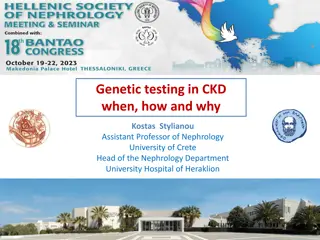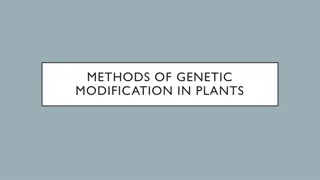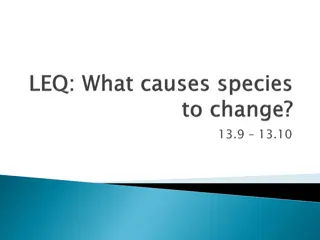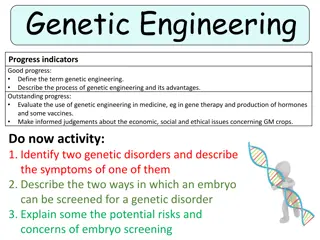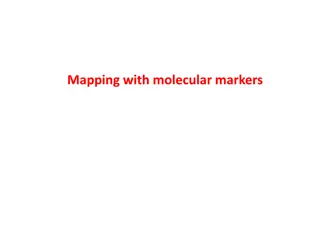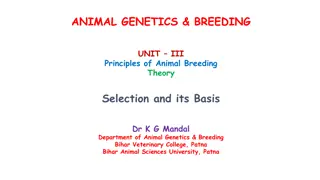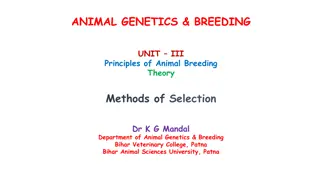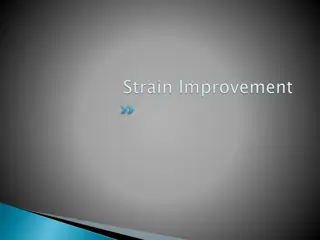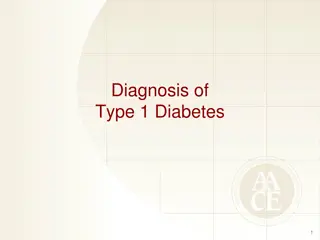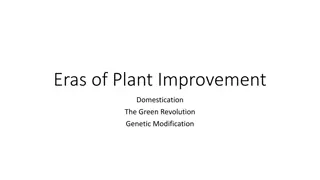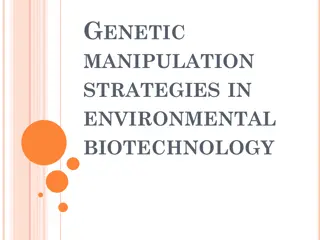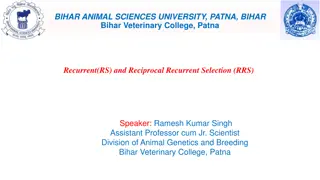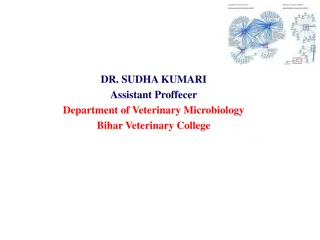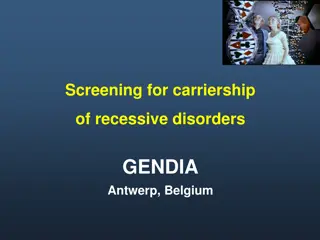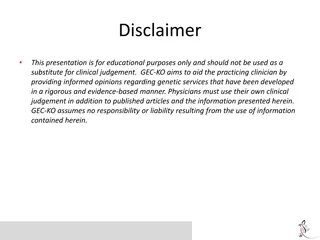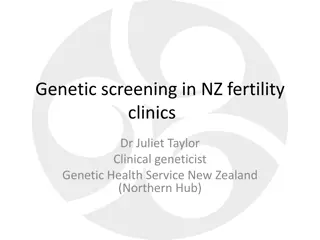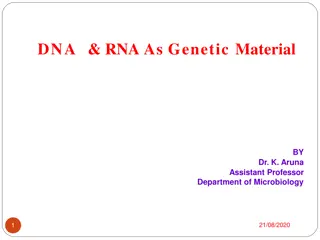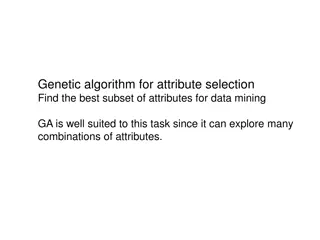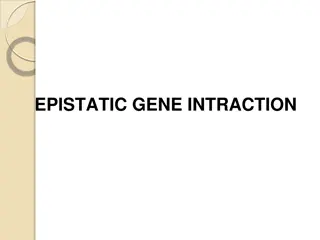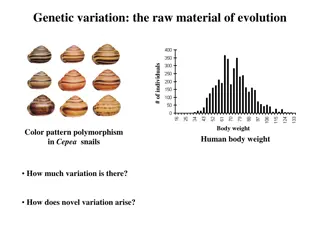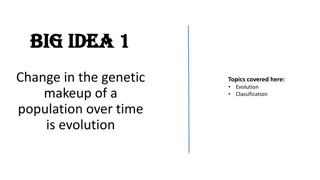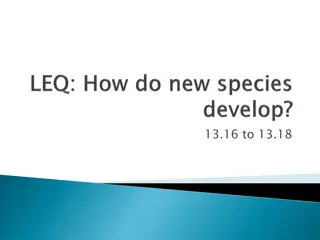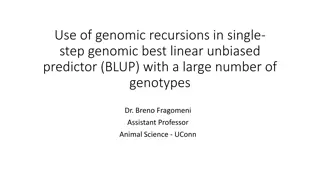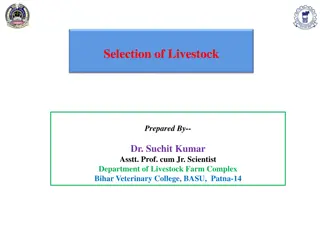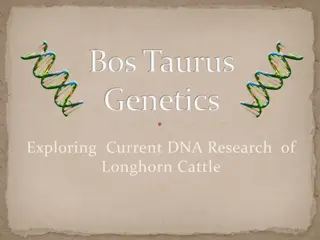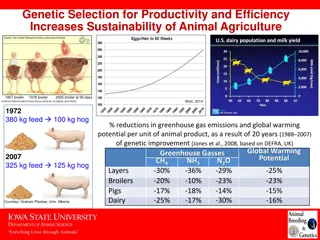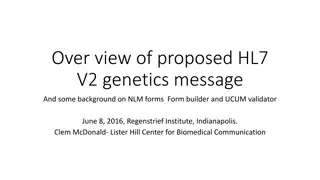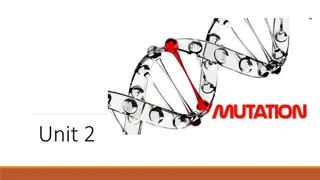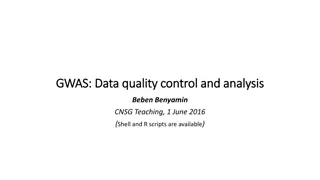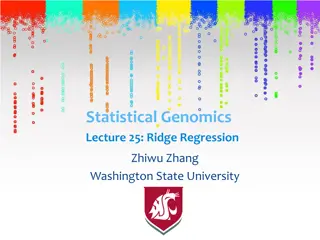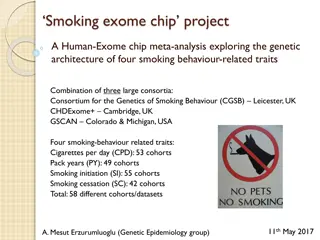Genetic Testing in Chronic Kidney Disease (CKD): Insights and Applications
Genetic testing plays a crucial role in identifying inherited kidney diseases, with around 15% of CKD cases having monogenic causes. Despite a high percentage of patients reporting a family history of CKD, Mendelian causes only account for about 10% of adult ESRD cases. Understanding the genetic bas
1 views • 52 slides
Overview of Human Genetic Disorders
Human genetic disorders encompass a range of conditions, from recessive disorders like cystic fibrosis to dominant disorders such as Huntington's disease. Examples include cystic fibrosis, Huntington's disease, and sickle-cell anemia. Understanding genetic disorders involves research and awareness o
0 views • 10 slides
Different Methods of Genetic Modification in Plants
Genetic modification in plants can occur through natural selection, selective breeding, and induced mutations. Natural selection involves breeding compatible species to create offspring with desired traits, while selective breeding is a multi-generational process to breed organisms with specific cha
0 views • 11 slides
Understanding Evolutionary Mechanisms: Natural Selection, Genetic Drift, and Gene Flow
Exploring the forces behind evolutionary change, this content delves into natural selection, genetic drift, and gene flow. Examples such as the bottleneck effect, founder effect, and Amish population polydactylism are presented to illustrate how these mechanisms shape genetic diversity. The impact o
0 views • 14 slides
Exploring Genetic Engineering: From Basics to Applications
Genetic engineering involves altering the genetic material of organisms to achieve desirable traits. This process entails cutting out specific genes from one organism and transferring them to another. In medicine, genetic engineering finds applications in gene therapy, hormone production, and vaccin
0 views • 12 slides
Understanding Genetic Markers in Molecular Mapping
Genetic markers play a crucial role in gene mapping within molecular biotechnology. They are fragments of DNA associated with specific genomic locations, aiding in identifying DNA sequences and analyzing genetic variation. Various types of genetic markers such as RFLP, SSR, and SNP offer insights in
1 views • 26 slides
Understanding Genetics: Mutations, Chromosomal Aberrations, and Genetic Engineering
Genetic mutations can be harmless, harmful, or beneficial, leading to variations within a species. Examples of gene mutations and chromosomal aberrations, like Trisomy 21, illustrate genetic abnormalities. The increase in Down Syndrome cases with maternal age highlights a maternal age effect. Geneti
0 views • 17 slides
Principles of Animal Breeding: Selection and its Basis
Selection in animal breeding involves choosing the best individuals to improve specific traits. Criteria for selection include individual merit, competitive exams, and interviews. Selection of farm animals focuses on non-random reproduction of genotypes. Types of selection include natural and artifi
1 views • 40 slides
Exploring Genetic Engineering: A Journey into Manipulating Organisms
Delve into the world of genetic engineering, where organisms' genetic makeup is altered for various purposes. Discover the process of modification, the history of genetic manipulation, and the impact of genetically modified organisms on society and science.
0 views • 20 slides
Principles of Animal Breeding Theory and Methods of Selection
Animal breeding involves selecting for desirable traits to improve the overall merit of animals. Methods such as tandem selection and multi-trait selection are used to enhance genetic progress. Economic value, genetic significance, and selection criteria play important roles in the breeding process.
1 views • 16 slides
Improving Microbial Productivity and Characteristics for Industrial Applications
Efforts to enhance the productivity of natural isolates for commercial products involve genetic modifications through mutation, genetic recombination, and genetic engineering techniques. Desired characteristics include genetic stability, efficient production, versatility in carbon sources, and ease
1 views • 25 slides
Classification and Genetic Defects of Diabetes
The diagnosis and differential diagnosis of Type 1 and Type 2 diabetes are discussed, detailing the clinical courses, age of onset, body weight characteristics, onset patterns, and genetic factors. The etiologic classification of diabetes including insulin-deficient, immune-mediated, monogenic, and
0 views • 16 slides
Evolution of Plant Improvement: Domestication to Genetic Modification
Plant improvement has evolved through different eras - from ancient domestication to the Green Revolution and genetic modification. Domestication shaped major crops over millennia, the Green Revolution introduced high-yielding varieties, and genetic modification allows direct genetic alterations for
0 views • 6 slides
Genetic Manipulation in Environmental Biotechnology
Genetic manipulation strategies in environmental biotechnology involve techniques like gene splicing and molecular cloning to modify genes directly. These methods have various applications such as isolating genes, producing specific molecules, improving biochemical production, creating organisms wit
0 views • 20 slides
Understanding Selection Strategies in Animal Genetics and Breeding
Genes influence traits through Additive Gene Action (AGA) and Non-Additive Gene Action (NAGA) in animal breeding. Recurrent Selection (RS) and Reciprocal Recurrent Selection (RRS) play crucial roles in improving animals. Selection for General Combining Ability (GCA) and Specific Combining Ability (S
0 views • 16 slides
Understanding Bacterial Transformation in Molecular Biology
Transformation in molecular biology is a process where genetic material is altered by the uptake of exogenous DNA. It involves the direct incorporation of genetic material into a cell, leading to genetic changes. This phenomenon was first demonstrated by Frederick Griffith in 1928. The process of tr
1 views • 25 slides
Understanding Genetic Counselors and the NSGC
Genetic counselors play vital roles in healthcare by assisting patients with genetic conditions, advocating for their needs, educating providers, conducting research, and influencing public policy. The National Society of Genetic Counselors (NSGC) supports genetic counselors in their professional en
3 views • 12 slides
Genetic Carrier Screening for Recessive Disorders by GENDIA, Antwerp, Belgium
Explore the world of genetic carrier screening offered by GENDIA in Antwerp, Belgium. Learn about prenatal screening for various genetic disorders, including Down syndrome and severe monogenic disorders. Discover the frequency of common recessive disorders and the severity of genetic diseases. Uncov
0 views • 17 slides
Exploring Expanded Carrier Screening in Family Planning
Learn about expanded carrier screening as a tool for identifying genetic risks in family planning scenarios. Understand the importance of genetic testing, considerations for non-consanguineous couples like Julie and Chris, and the evolving landscape of genetic services. Explore key aspects such as f
1 views • 36 slides
Genetic Screening and Reproductive Carrier Testing in New Zealand Fertility Clinics
Genetic screening and reproductive carrier testing play crucial roles in identifying and managing genetic disorders in couples planning for pregnancy. While carrier screening is recommended for all couples, it is not widely followed in New Zealand. Pre-conceptual reproductive carrier screening is no
0 views • 19 slides
Understanding Direct-to-Consumer Genetic Testing: Cases and Considerations
Explore real-life scenarios of individuals opting for Direct-to-Consumer Genetic Testing (DTC-GT) to assess genetic risk for various health conditions. Consider the implications, limitations, and cautions associated with DTC-GT, highlighting the importance of comprehensive evaluation and genetic cou
0 views • 39 slides
Understanding Genetic Disorders and Their Impact on Health
Genetic disorders are caused by abnormalities in genes or chromosomes, leading to various health conditions. Inherited disorders can be passed down from parents to children, affecting physical makeup and processes in the body. In India, there is a high prevalence of genetic disorders, particularly i
1 views • 12 slides
Understanding DNA and RNA as Genetic Material
Genetic material plays a crucial role in the transmission of traits from one generation to the next. This article explores the significance of DNA and RNA as genetic material, highlighting key experiments and discoveries that demonstrate DNA's role in carrying hereditary information. From Mendel's h
0 views • 32 slides
Understanding the Key Articles of the Nagoya Protocol on Access to Genetic Resources and Benefit-Sharing
The Nagoya Protocol aims to promote fair sharing of benefits from genetic resources utilization for conservation efforts. It encompasses access, technology transfer, funding, and respect for rights over resources and technologies. The protocol applies to genetic resources, traditional knowledge, and
1 views • 19 slides
Genetic Algorithm for Attribute Selection in Data Mining
Genetic algorithm (GA) is a powerful method for attribute selection in data mining as it efficiently explores numerous attribute combinations. By choosing the most important features and ignoring the rest, GA can enhance the data analysis process through methods like feature extraction and artificia
0 views • 41 slides
Understanding Epistasis: Genetic Interactions and Their Implications
Epistasis is a phenomenon where the phenotypic expression of one gene is influenced by interactions with another gene. This concept, first introduced in 1909, plays a crucial role in genetics, affecting various traits and evolutionary processes. The difference between dominance and epistasis lies in
0 views • 41 slides
Understanding Genetic Variation and Its Role in Evolution
Genetic variation is crucial for evolution, providing the raw material for adaptation and species diversity. Phenotypic variation can arise from differences in genotype, environment, or their interaction. Studying genetic variation through statistical analysis and at the molecular level helps us unr
0 views • 47 slides
Understanding Evolution: Natural Selection and Genetic Variation
Change in genetic makeup over time is evolution. Natural selection, driven by competition for resources, leads to differential survival and reproductive success. Genetic variation, mutation, and adaptation play roles in this process. Environmental changes influence evolutionary rate and direction. H
0 views • 20 slides
Evolutionary Computation and Genetic Algorithms Overview
Explore the world of evolutionary computation and genetic algorithms through a presentation outlining the concepts of genetic algorithms, parallel genetic algorithms, genetic programming, evolution strategies, classifier systems, and evolution programming. Delve into scenarios in the forest where gi
0 views • 51 slides
Understanding Natural Selection and Its Mechanisms
Explore the concepts of natural selection, survival of the fittest, and various types of selection processes in evolutionary biology. From the struggle for existence to sexual selection, learn how organisms adapt to their environment through genetic contributions and mating strategies. Discover exam
0 views • 8 slides
Genomic Recursions in Genomic BLUP for Animal Breeding
Explore the application of genomic recursions in single-step genomic best linear unbiased predictor (BLUP) for genetic evaluations in animal breeding. Understand the significance of using genomic data to improve genetic selection, increase accuracy, shorten generation intervals, and enhance genetic
0 views • 31 slides
Understanding Selection Methods in Livestock Breeding
Livestock breeding involves various methods of selection such as individual selection, pedigree selection, progeny selection, and more. These methods aim to improve desirable traits in animals through controlled breeding programs. Selection criteria include performance, genetic lineage, and specific
0 views • 27 slides
Exploring Longhorn Cattle Genetics Through DNA Research
Longhorn cattle genetics are being investigated through DNA research to identify unique traits and differentiate them from other cattle breeds. By analyzing genetic codes with scatter plot graphs, scientists aim to map the genetic makeup of Longhorns accurately. This research helps in understanding
0 views • 9 slides
Advancements in Genetic Selection for Sustainable Animal Agriculture
The evolution of genetic selection in animal agriculture has significantly enhanced productivity and efficiency, leading to reductions in greenhouse gas emissions and global warming potential. Various studies highlight the positive impact of genetic improvement on broilers, pigs, and dairy animals.
0 views • 5 slides
Overview of HL7 V2 Genetics Messaging and LOINC Genetic Testing Codes
This content delves into the proposed HL7 V2 genetics message, NLM forms builder, UCUM validator, and the current state of genetic testing codes in LOINC. It discusses the types of molecular genetic tests present in LOINC and the evolution towards newer genetic tests. The content also covers how LOI
0 views • 21 slides
Understanding Genetic Mutation and Its Impact on Evolution
Genetic mutations are a natural process that introduces variations in DNA sequences, creating new alleles and genetic diversity within populations. These mutations can have both positive and negative effects on individuals, influencing survival and reproduction. By examining different types of mutat
0 views • 28 slides
Understanding GWAS: A Brief Overview of Genetic Association Studies
GWAS, or Genome-Wide Association Studies, are a method used to map genes associated with traits or diseases by analyzing genetic markers throughout the genome. This process involves statistically testing the association between SNPs and traits using regression or chi-squared tests in a hypothesis-fr
0 views • 19 slides
Concept Development and Implementation of Ridge Regression in Genomic Selection
This presentation delves into the concept development and implementation of ridge regression in genomic selection, emphasizing the importance of avoiding overfitting by regulating parameters and distinguishing between fixed and random effects. The pioneers of ridge regression and Bayesian methods ar
0 views • 26 slides
Genetic Architecture of Smoking Behavior Traits: Meta-Analysis Insights
Exploring the genetic basis of smoking behavior-related traits through a meta-analysis combining data from three large consortia across 58 different cohorts/datasets. The study investigates genetic variants associated with cigarettes per day, pack years, smoking initiation, and smoking cessation. Ov
0 views • 34 slides
Evolutionary Computation Explained Through Genetic Algorithms
Explore the world of evolutionary computation with a focus on genetic algorithms. Learn how non-classical search and model evaluation contribute to maximizing objective functions. Delve into the detailed process of generating and evaluating populations, selection techniques, and the key aspects of g
0 views • 22 slides
